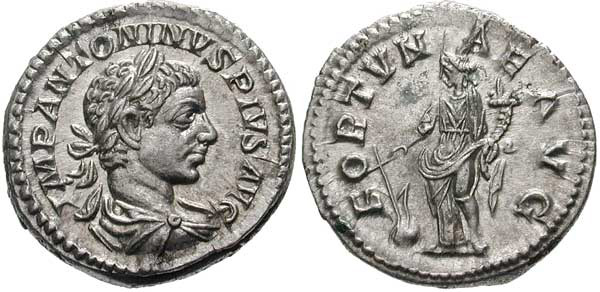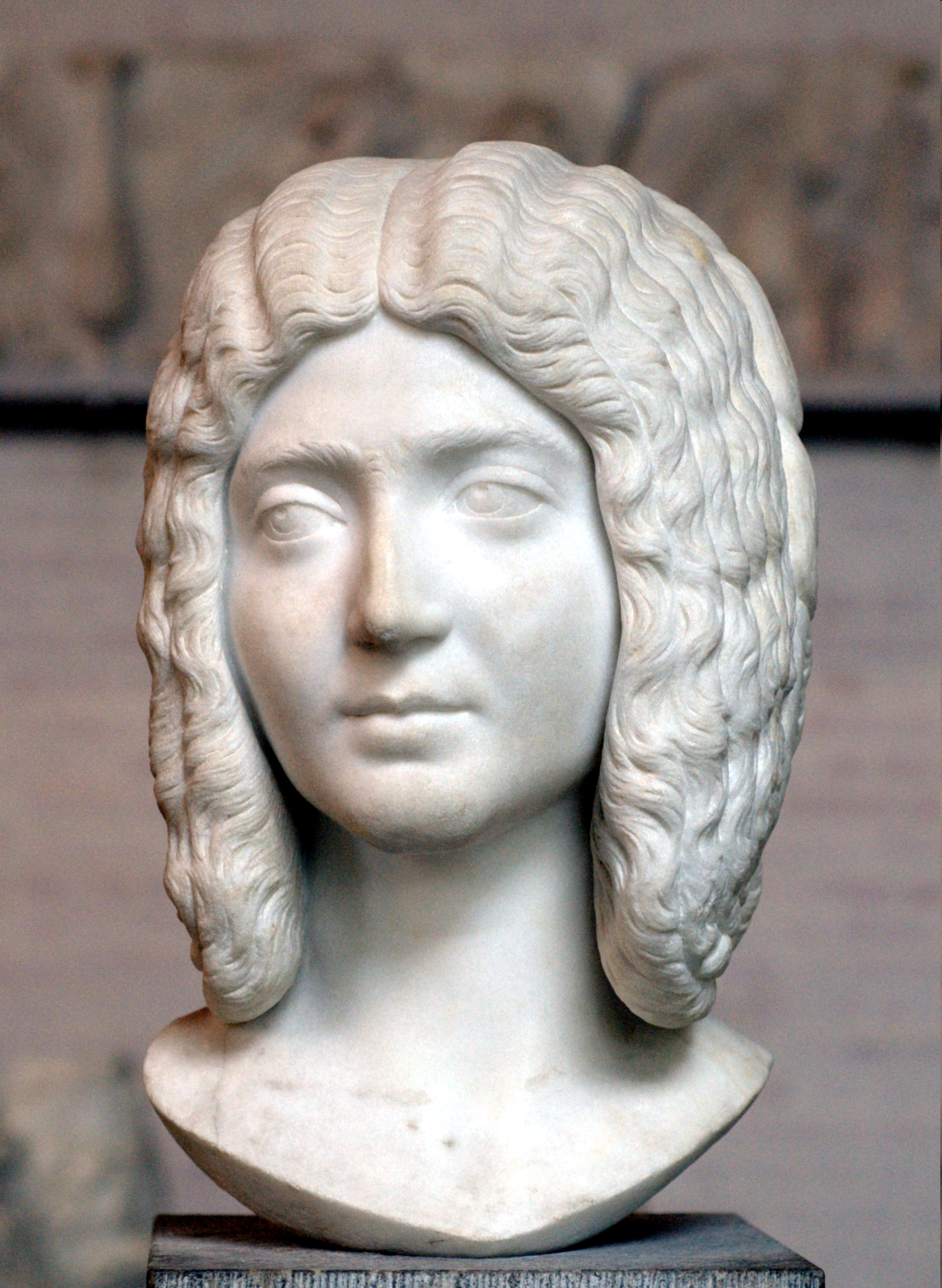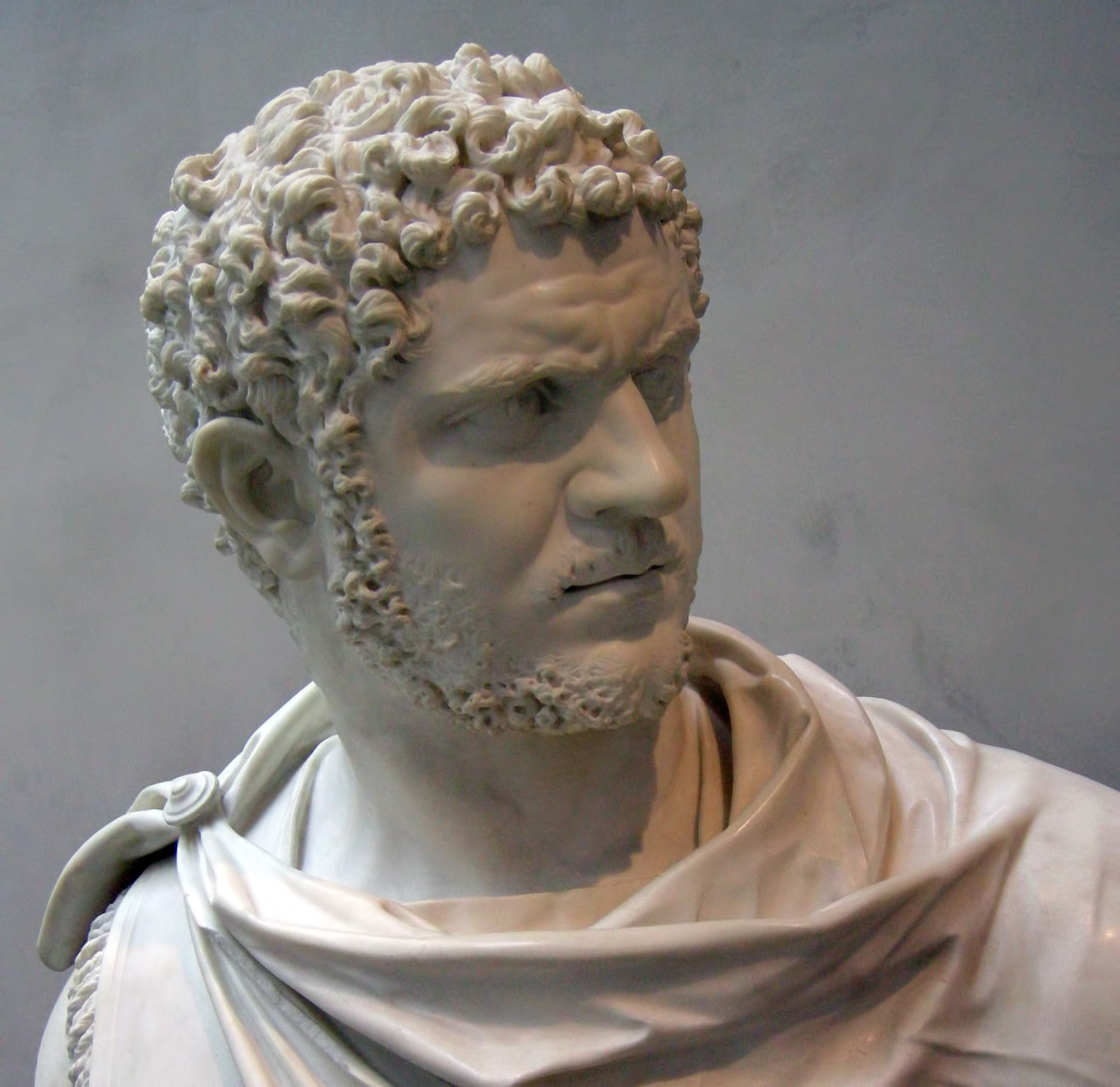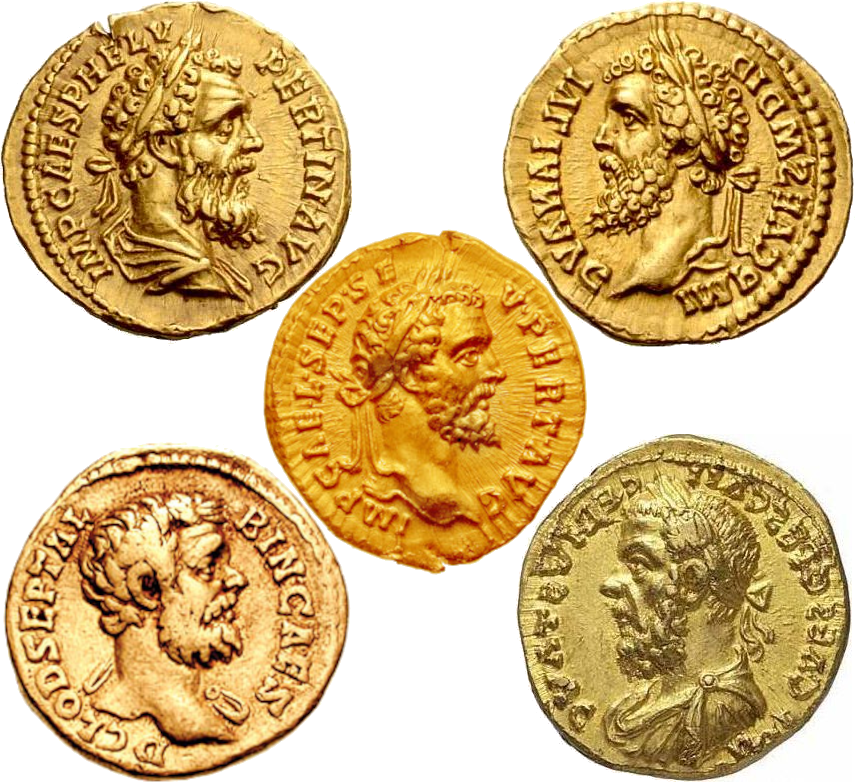|
Julia Domna
Julia Domna (; – 217 AD) was Roman empress from 193 to 211 as the wife of Emperor Septimius Severus. She was the first empress of the Severan dynasty. Domna was born in Emesa (present-day Homs) in Roman Syria to an Arab family of priests of the deity Elagabalus. In 187, she married Severus, who at the time was governor of the Roman province of Gallia Lugdunensis. They had two sons, Caracalla and Geta. A civil war over the Roman throne broke out in 193, and shortly afterwards Severus declared himself emperor. The war ended in 197 with the defeat of the last of Severus's opponents. As empress, Domna was famous for her political, social, and philosophical influence. She received titles such as "Mother of the Invincible Camps".; la, Mater invictorum castrorum. After the elder of her sons, Caracalla, started ruling with his father, she was briefly co-empress with Caracalla's wife, Fulvia Plautilla, until the latter fell into disgrace. Following the death of Severus in ... [...More Info...] [...Related Items...] OR: [Wikipedia] [Google] [Baidu] |
Elagabalus
Marcus Aurelius Antoninus (born Sextus Varius Avitus Bassianus, 204 – 11/12 March 222), better known by his nickname "Elagabalus" (, ), was Roman emperor from 218 to 222, while he was still a teenager. His short reign was conspicuous for sex scandals and religious controversy. A close relative to the Severan dynasty, he came from a prominent Arab family in Emesa (Homs), Syria, where since his early youth he served as head priest of the sun god Elagabal. After the death of his cousin, the emperor Caracalla, Elagabalus was raised to the principate at 14 years of age in an army revolt instigated by his grandmother Julia Maesa against Caracalla's short-lived successor, Macrinus. He only posthumously became known by the Latinised name of his god. Later historians suggest Elagabalus showed a disregard for Roman religious traditions and sexual taboos. He replaced the traditional head of the Roman pantheon, Jupiter, with the deity Elagabal, of whom he had been high priest. ... [...More Info...] [...Related Items...] OR: [Wikipedia] [Google] [Baidu] |
Severan Dynasty
The Severan dynasty was a Roman imperial dynasty that ruled the Roman Empire between 193 and 235, during the Roman imperial period. The dynasty was founded by the emperor Septimius Severus (), who rose to power after the Year of the Five Emperors as the victor of the civil war of 193–197, and his wife, Julia Domna. After the short reigns and assassinations of their two sons, Caracalla () and Geta (), who succeeded their father in the government of the empire, Julia Domna's relatives themselves assumed power by raising Elagabalus () and then Severus Alexander () to the imperial office. The dynasty's control over the empire was interrupted by the joint reigns of Macrinus () and his son Diadumenian (). The dynasty's women, including Julia Domna, the mother of Caracalla and Geta, and her nieces Julia Soaemias and Julia Mamaea, the mothers respectively of Elagabalus and Severus Alexander, and their own mother, Julia Maesa, were all powerful '' augustae'' and instrumental in sec ... [...More Info...] [...Related Items...] OR: [Wikipedia] [Google] [Baidu] |
Septimius Severus
Lucius Septimius Severus (; 11 April 145 – 4 February 211) was Roman emperor from 193 to 211. He was born in Leptis Magna (present-day Al-Khums, Libya) in the Roman province of Africa. As a young man he advanced through the customary succession of offices under the reigns of Marcus Aurelius and Commodus. Severus seized power after the death of the emperor Pertinax in 193 during the Year of the Five Emperors. After deposing and killing the incumbent emperor Didius Julianus, Severus fought his rival claimants, the Roman generals Pescennius Niger and Clodius Albinus. Niger was defeated in 194 at the Battle of Issus in Cilicia. Later that year Severus waged a short punitive campaign beyond the eastern frontier, annexing the Kingdom of Osroene as a new province. Severus defeated Albinus three years later at the Battle of Lugdunum in Gaul. Following the consolidation of his rule over the western provinces, Severus waged another brief, more successful war in the east again ... [...More Info...] [...Related Items...] OR: [Wikipedia] [Google] [Baidu] |
Augusta (honorific)
Augusta may refer to: Places Australia * Augusta, Western Australia Brasil * Rua Augusta (São Paulo) Canada * Augusta, Ontario * North Augusta, Ontario * Augusta Street (Hamilton, Ontario) France * Augusta Suessionum ("Augusta of the Suessii"), Soissons * Augusta Viromanduorum ("Augusta of the Viromandui"), Saint-Quentin Germany * Augusta Treverorum ("Augusta of the Treveri") or Trier * Augusta Vindelicorum ("Augusta of the Vindelici") or Augsburg Italy * Augusta, Sicily * Augusta Praetoria Salassorum ("Praetorian Augusta of the Salassi") or Aosta * Augusta Taurinorum ("Augusta of the Taurini") or Turin * Perugia or ''Augusta Perusia'' Spain * Emerita Augusta, Mérida, Spain * Caesar Augusta, Zaragoza, Spain United States * Augusta, Arkansas * Augusta Charter Township, Michigan * Augusta County, Virginia * Augusta, Georgia ** Augusta National Golf Club ("Augusta"), home of the Masters Tournament * Augusta, Illinois * Augusta, Indiana * Augusta, Indianapolis, Indi ... [...More Info...] [...Related Items...] OR: [Wikipedia] [Google] [Baidu] |
Julia Maesa
Julia Maesa (7 May before 160 AD – AD) was a member of the Severan dynasty of the Roman Empire who was the grandmother of emperors Elagabalus and Severus Alexander, elder sister of empress Julia Domna, and mother of Julia Soaemias and Julia Mamaea. She wielded influence during the reigns of her grandsons as Augusta of the Empire from 218 to her death, especially on their elevation to emperors. Born in Emesa, Syria (modern day Homs), to an Arab family of priests of the deity Elagabalus, Maesa and her sister Domna were the daughters of Julius Bassianus. Through her sister's marriage, Maesa became sister-in-law to Septimius Severus and aunt of Caracalla and Geta, who all became emperors. She married fellow Syrian Julius Avitus, who was of consular rank. She bore him two daughters, Soaemias and Mamaea, who became mothers of Elagabalus and Severus Alexander, respectively. As one of the Severan dynasty's prominent women, Maesa sought to return to power after her sister's s ... [...More Info...] [...Related Items...] OR: [Wikipedia] [Google] [Baidu] |
Parthian War Of Caracalla
The Parthian war of Caracalla was an unsuccessful campaign by the Roman Empire under Caracalla against the Parthian Empire in 216–17 AD. It was the climax of a four-year period, starting in 213, when Caracalla pursued a lengthy campaign in central and eastern Europe and the Near East. After intervening to overthrow rulers in client kingdoms adjoining Parthia, he invaded in 216 using an abortive wedding proposal to the Parthian king Artabanus's daughter as a ''casus belli''. His forces carried out a campaign of massacres in the northern regions of the Parthian Empire before withdrawing to Asia Minor, where he was assassinated in April 217. The war was ended the following year after Parthian victory at the Battle of Nisibis, with the Romans paying a huge sum of war reparations to the Parthians. Events leading up to the war In the years immediately before the war, Parthia was roiled by a conflict between the two sons of King Vologases V. Vologases VI succeeded his father in ... [...More Info...] [...Related Items...] OR: [Wikipedia] [Google] [Baidu] |
Empress Dowager
Empress dowager (also dowager empress or empress mother) () is the English language translation of the title given to the mother or widow of a Chinese, Japanese, Korean, or Vietnamese emperor in the Chinese cultural sphere. The title was also given occasionally to another woman of the same generation, while a woman from the previous generation was sometimes given the title of grand empress dowager (). Numerous empress dowagers held regency during the reign of underage emperors. Many of the most prominent empress dowagers also extended their control for long periods after the emperor was old enough to govern. This was a source of political turmoil according to the traditional view of Chinese history. The title dowager empress was given to the wife of a deceased emperor of Russia or Holy Roman emperor. By country ''For grand empresses dowager, visit grand empress dowager.'' East Asia Chinese empresses dowager ; Han dynasty * Empress Dowager Lü (241-180 BC), empress co ... [...More Info...] [...Related Items...] OR: [Wikipedia] [Google] [Baidu] |
Fulvia Plautilla
Publia Fulvia Plautilla (c. 185/around 188/189 – 211) was the wife of the Roman emperor Caracalla, her paternal second cousin. After her father was condemned for treason, she was exiled and eventually killed, possibly on Caracalla's orders. Birth and family Plautilla was born and raised in Rome. She belonged to the '' gens Fulvia'' of ancient Rome. The Fulvius family was of plebeian origin, came from Tusculum, Italy and had been active in politics since the Roman Republic. Her mother was named Hortensia; her father was Gaius Fulvius Plautianus, the Commander of the Praetorian Guard, consul, paternal first cousin and close ally to Roman Emperor Lucius Septimius Severus (the father of Caracalla). She also had a brother, Gaius Fulvius Plautius Hortensianus. Severus and Plautianus arranged for Plautilla and Caracalla to be married in a lavish ceremony in April 202. The forced marriage proved to be very unhappy; Caracalla despised her. According to Cassius Dio, Plautilla had a p ... [...More Info...] [...Related Items...] OR: [Wikipedia] [Google] [Baidu] |
Year Of The Five Emperors
The Year of the Five Emperors was AD 193, in which five men claimed the title of Roman emperor: Pertinax, Didius Julianus, Pescennius Niger, Clodius Albinus, and Septimius Severus. This year started a period of civil war when multiple rulers vied for the chance to become emperor. The political unrest began with the murder of Emperor Commodus on New Year's Eve 192. Once Commodus was assassinated, Pertinax was named emperor, but immediately aroused opposition in the Praetorian Guard when he attempted to initiate reforms. They then plotted his assassination, and Pertinax was killed while trying to reason with the mutineers. He had only been emperor for three months. Didius Julianus, who purchased the title from the Praetorian Guard, succeeded Pertinax, but was ousted by Septimius Severus and executed on June 1. Severus was declared Caesar by the Senate, but Pescennius Niger was hostile when he declared himself emperor. This started the civil war between Niger and Severus; both gat ... [...More Info...] [...Related Items...] OR: [Wikipedia] [Google] [Baidu] |
Gallia Lugdunensis
Gallia Lugdunensis (French: ''Gaule Lyonnaise'') was a province of the Roman Empire in what is now the modern country of France, part of the Celtic territory of Gaul formerly known as Celtica. It is named after its capital Lugdunum (today's Lyon), possibly Roman Europe's major city west of Italy, and a major imperial mint. Outside Lugdunum was the Sanctuary of the Three Gauls, where representatives met to celebrate the cult of Rome and Augustus. History In ''De Bello Gallico'' describing his conquest of Gaul (58–50 BC), Julius Caesar distinguished between ''provincia nostra'' in the south of Gaul, which already was a Roman province in his time, and the three other parts of Gaul: the territories of the ''Aquitani'', of the ''Belgae'', and of the ''Galli'' also known as the ''Celtae''. The territory of the Galli extended from the rivers Seine and Marne in the north-east, which formed the boundary with Gallia Belgica, to the river Garonne in the south-west, which formed the bor ... [...More Info...] [...Related Items...] OR: [Wikipedia] [Google] [Baidu] |
Elagabalus (deity)
Elagabalus (), Aelagabalus, Heliogabalus, () or simply Elagabal (Aramaic: 𐡁𐡋𐡄𐡂𐡀𐡋 ''ʾĕlāhgabāl'' or 𐡁𐡋𐡄𐡀𐡂𐡀𐡋 ''ʾĕlāhaʾgabāl''; Arabic: إله الجبل ''Ilah al-Jabal'', "mountain god") was an Arab-Roman sun god, initially venerated in Emesa (modern-day Homs), Syria. Although there were many variations of the name, the god was consistently referred to as Elagabalus in Roman coins and inscriptions from AD 218 on, during the reign of emperor Elagabalus. Cult Elagabalus was initially venerated at Emesa in Syria, where the Arab Emesan dynasty acted as its priests. The name is the Latinised form of the Arabic "Ilah al-Jabal" ("إله الجبل"), the Emesene manifestation of the deity, which is Arabic for "God of the Mountain." Elagabalus was the religious "lord", or Ba'al, of Emesa. The deity successfully preserved Arab characteristics, both in his names and in his representations. The cult of the deity spread to ot ... [...More Info...] [...Related Items...] OR: [Wikipedia] [Google] [Baidu] |
Arab
The Arabs (singular: Arab; singular ar, عَرَبِيٌّ, DIN 31635: , , plural ar, عَرَب, DIN 31635, DIN 31635: , Arabic pronunciation: ), also known as the Arab people, are an ethnic group mainly inhabiting the Arab world in Western Asia, North Africa, the Horn of Africa, and the western List of islands in the Indian Ocean, Indian Ocean islands (including the Comoros). An Arab diaspora is also present around the world in significant numbers, most notably in the Americas, Western Europe, Arabs in Turkey, Turkey, Arab Indonesians, Indonesia, and Iranian Arabs, Iran. In modern usage, the term "Arab" tends to refer to those who both Arab identity, carry that ethnic identity and speak Arabic as their native language. This contrasts with the narrower traditional definition, which refers to the descendants of the tribes of Arabia. The religion of Islam was developed in Arabia, and Classical Arabic serves as the language of Islamic literature. 93 percent of Arabs are Muslims ... [...More Info...] [...Related Items...] OR: [Wikipedia] [Google] [Baidu] |







